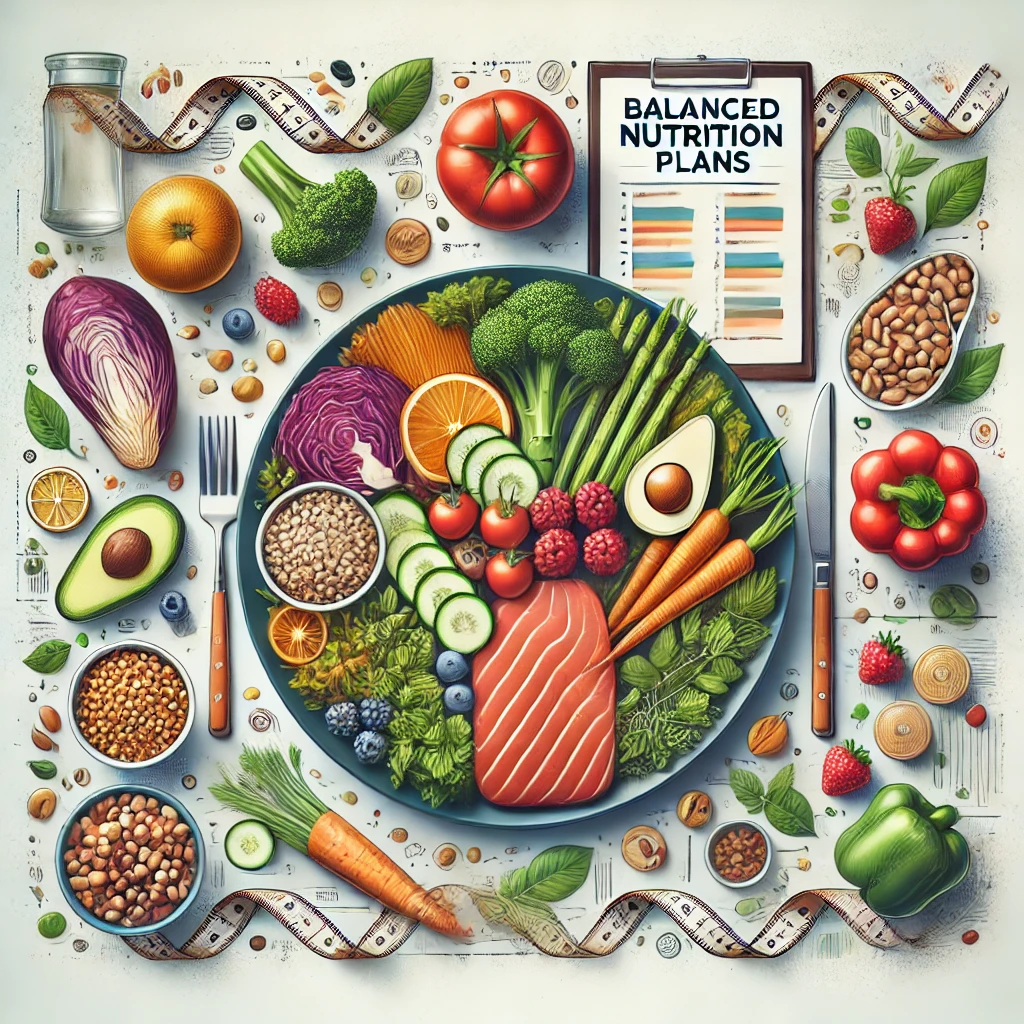Introduction
A well-balanced diet is essential for maintaining overall health, supporting fitness goals, and improving daily performance. Whether you’re an athlete, a runner, or someone looking to lose weight, having the right nutrition plan can make all the difference. In this guide, we’ll explore nutrition plans for athletes, weight loss, fat loss, muscle gain, and marathon training, while also touching on general healthy eating habits.

What is a Balanced Nutrition Plan?
A balanced nutrition plan focuses on providing your body with essential nutrients in the right proportions. It includes a variety of whole foods, proper hydration, and the correct balance of macronutrients (proteins, fats, and carbohydrates) to support your goals.
What is a Good Nutrition Plan?
A good nutrition plan is one that aligns with your personal health goals, lifestyle, and dietary preferences. It should be sustainable, balanced, and include all essential nutrients while avoiding extreme restrictions.
What is a Nutrition Diet Plan?
A nutrition diet plan is a structured way of eating that prioritizes nutrient-dense foods to support overall well-being. It typically includes a variety of whole grains, lean proteins, healthy fats, and fiber-rich vegetables and fruits.

Nutrition Plans for Different Goals
Nutrition Plans for Athletes
Athletes require a well-structured nutrition plan to fuel their workouts, enhance recovery, and optimize performance. A nutrition plan for athletes includes:
- Carbohydrates: Provide energy and endurance. Whole grains, fruits, and vegetables should be included.
- Proteins: Essential for muscle repair and recovery. Lean meats, dairy, eggs, and plant-based proteins are great options.
- Healthy Fats: Support brain function and energy levels. Avocados, nuts, and olive oil are great sources.
- Hydration: Essential for peak performance. Aim for at least 2-3 liters of water daily.
Nutrition Plans for Runners
Runners need a diet that supports endurance, strength, and quick recovery. A well-rounded nutrition plan for runners includes:
- Complex carbohydrates: Whole grains, sweet potatoes, and oats.
- Lean proteins: Chicken, fish, legumes, and tofu.
- Electrolytes: Sodium, potassium, and magnesium from sources like bananas, nuts, and leafy greens.
- Hydration: Drink enough water before, during, and after runs to prevent dehydration.
Nutrition Plans for Weight Loss
If you’re aiming to lose weight, the key is to create a calorie deficit while maintaining adequate nutrition. A nutrition plan for weight loss includes:
- High-protein meals: Helps keep you full and preserves muscle mass.
- Fiber-rich foods: Supports digestion and prevents overeating.
- Healthy fats: Keeps you satisfied and supports metabolism.
- Portion control: Using a 7-day diet plan for weight loss can be beneficial.
Nutrition Plans for Fat Loss
Fat loss focuses on reducing body fat while maintaining muscle mass. A nutrition plan for fat loss includes:
- Increased protein intake: Supports muscle maintenance.
- Lower carbohydrate intake: Encourages fat burning.
- Intermittent fasting or meal timing strategies.

Nutrition Plans for Muscle Gain
Building muscle requires a nutrition plan for muscle gain that supports recovery and muscle growth. Key elements include:
- High-protein intake: At least 1.3 to 2.2g per kg of body weight.
- Caloric surplus: More energy intake than expenditure.
- Strength training support: A mix of carbs and proteins post-workout.
Nutrition Plans for Marathon Training
For endurance athletes, a nutrition plan for marathon training is essential. It includes:
- Gradual carbohydrate loading before long runs.
- Hydration and electrolytes to prevent cramps and fatigue.
- Post-run recovery meals with protein and healthy fats.
Nutrition Plans for 75 Hard Challenge
The 75 Hard challenge requires mental and physical discipline, including a strict diet. A nutrition plan for 75 Hard should focus on:
- Whole, unprocessed foods with no cheat meals.
- Consistent hydration and meal timing.
- Eliminating sugar and alcohol.
Nutrition Plans for Women
Women have unique nutritional needs, and a nutrition plan for women should include:
- Iron-rich foods: To prevent deficiency.
- Calcium and Vitamin D: Supports bone health.
- Balanced macronutrients: To support hormonal balance.
7-Day Healthy Eating Plan
A structured 7-day healthy eating plan can help maintain consistency and achieve nutrition goals. Each day should include:
- Lean proteins and complex carbs for sustained energy.
- Plenty of fruits and vegetables for vitamins and minerals.
- Hydration reminders to ensure optimal performance.
Free Nutrition Plans
Looking for a nutrition plan free of charge? Many online resources provide nutrition plans PDF to help structure your diet effectively.
What is the 3-Phase Nutrition Plan?
A 3-phase nutrition plan typically involves:
- Phase 1 (Detox & Reset): Eliminating processed foods, sugars, and unhealthy fats.
- Phase 2 (Balanced Eating): Introducing nutrient-dense meals with proper macronutrient balance.
- Phase 3 (Sustainable Nutrition): Establishing long-term healthy eating habits to maintain results.
What Are the 7 Key Nutrients?
The seven key nutrients essential for optimal health are:
- Carbohydrates – Provide energy for daily activities.
- Proteins – Support muscle repair and growth.
- Fats – Essential for brain function and hormone production.
- Vitamins – Help in bodily functions and disease prevention.
- Minerals – Important for bone health, hydration, and nerve function.
- Water – Essential for hydration, digestion, and overall well-being.
- Fiber – Supports digestive health and helps in weight management.
Conclusion
Creating a personalized nutrition plan can greatly improve your health and performance. Whether you’re looking for a nutrition plan to lose weight, gain muscle, or train for a marathon, following a structured diet can help you achieve your goals. Stay consistent, make smart food choices, and keep hydrated for the best results!
